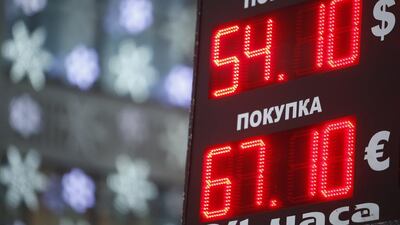The last two weeks have been troubling for Russia, as the value of the rouble plunged to an all-time low and continued to decline against the US dollar. It was troubling for ordinary Russians, troubling for the political leadership, and troubling, indeed, for many parts of the world, including this one.
Start with the rouble’s latest woes: earlier this week, the credit rating agency Standard & Poor’s revised its projections for Russia’s sovereign credit rating, raising the prospect that it could move into junk territory for the first time in a decade. That affects ordinary Russians, who remember all too well the destruction of their savings in the 1990s. But it also has a significant impact on Russian companies, which will find it even harder to access credit. Those with existing loans in dollars or euros will find it more expensive to pay off the debt.
This region understands the root cause of some of Russia’s troubles pretty well. The rouble tumbled on the back of lower oil prices because revenue from it funds a substantial part of Russia’s budget. For the Gulf states too, oil’s falling price means less money flowing into the coffers, but the impact is obviously greater on cash-strapped countries.
This could make for greater amiability. If Iran begins to feel the squeeze of lower oil prices, it may rethink its support for Bashar Al Assad in Syria, for militia groups such as Hizbollah and the Houthis, and, perhaps, even its nuclear programme. Poorer now, Russia too may be forced to tone down its aggressive support for the Assad regime.
That said, the impact of Russia’s woes will also be felt by the UAE’s businesses. Russian tourists make up a big contingent of visitors to Dubai and the Northern Emirates. This time of year, when Russia freezes, is precisely when they prefer to come, sunbathe and shop. The rouble’s weakness against the dollar – to which the dirham is pegged – means they have less to spend and may decide the trip is too expensive anyway. There are risks and rewards of living in an interdependent world. Even those who have never been to Russia can be affected by the seeming failure of Putinomics.

